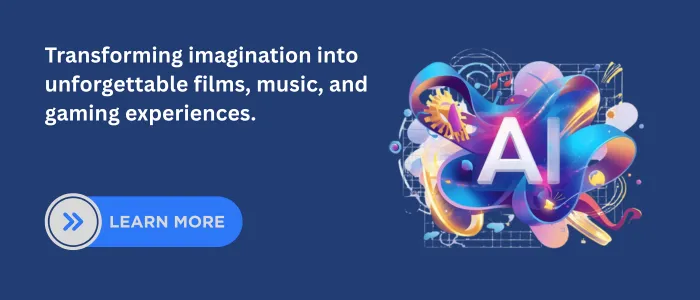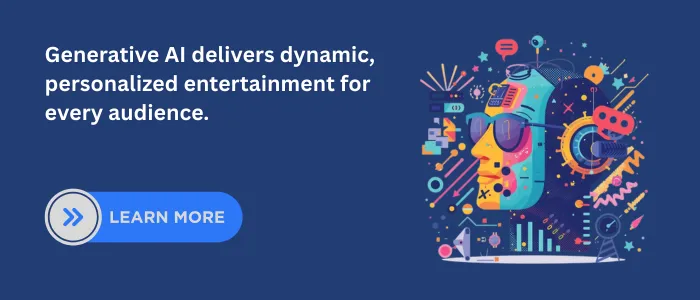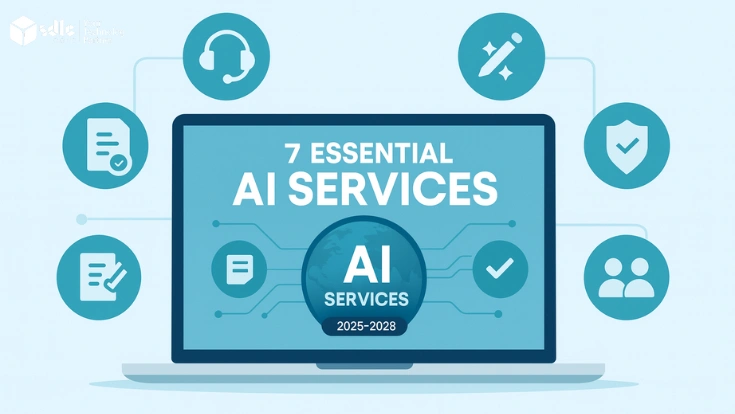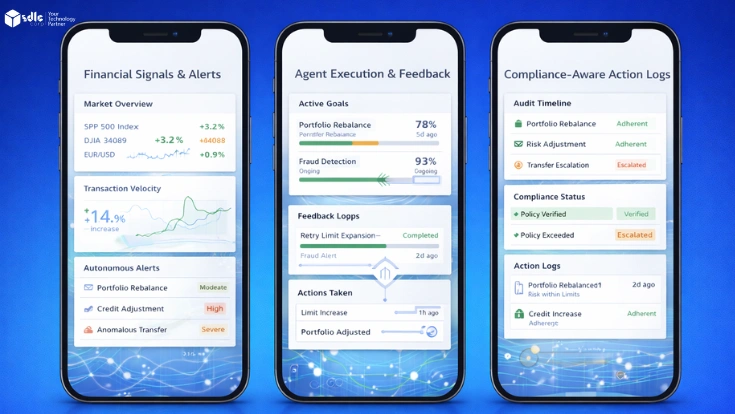Introduction
Generative AI is revolutionizing the creative industries, bringing unprecedented innovation to film, music, gaming, and advertising. It blends human imagination with machine intelligence to create fresh, engaging content at scale. What once demanded months of effort can now be produced in minutes, reshaping production workflows. The market reflects this surge, with AI in entertainment projected to grow from $1.9 billion in 2020 to over $12 billion by 2030. Venture capital funding for creative AI startups has tripled since 2020, highlighting investor confidence. Major studios and streaming platforms are already integrating AI into writing, animation, and audio production. This shift is not just about efficiency but also about amplifying artistic possibilities. Generative AI empowers personalization, enabling content tailored to each individual’s preferences. If you’re considering advanced solutions, explore what AI Development Services offers as a partner for scalable, cutting-edge AI tools.
Generative AI in Modern Entertainment Ecosystems
Entertainment platforms now manage large volumes of scripts, audio, video, and user interaction data. Generative AI systems help automate content generation, enhance creative workflows, and support personalization at scale. Many studios explore these capabilities through Generative AI development services when experimenting with new production and distribution models.
1. What Is Generative AI in Entertainment?

Generative AI in entertainment represents a major shift from machines that simply analyze data to systems capable of creating original works. Instead of stopping at recognition or categorization, these models can write new scripts, compose music, generate digital art, or design immersive game environments that never existed before. This evolution positions AI as not just a supportive tool but as an active creative partner.
Core Technologies Powering Generative AI
Large Language Models (LLMs): Used to write dialogue, scripts, and interactive storytelling.
Generative Adversarial Networks (GANs): Best for producing highly realistic visuals and images.
Neural Networks: Train on massive datasets to recognize styles and generate content across multiple formats.
Types of Content AI Can Create
Film and television scripts.
Visual assets, artwork, and animations.
Music compositions and soundtracks.
Game environments, characters, and 3D assets.
The benefits of generative AI are equally important. It dramatically accelerates production cycles by automating repetitive tasks, while offering scalability to handle projects of any size. At the same time, it opens new creative possibilities by allowing experimentation that would otherwise be too expensive or time-consuming. This balance of speed, efficiency, and creativity is why generative AI is quickly becoming indispensable in the entertainment sector.
2. How Generative AI Is Transforming Movies and TV
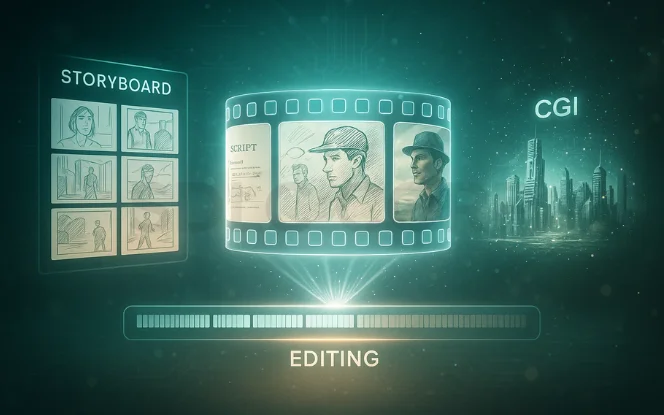
Generative AI is playing a transformative role in the film and television industry, reshaping how content is planned, produced, and delivered. By automating complex creative processes and enhancing production efficiency, it empowers studios to reduce costs, speed up timelines, and experiment with innovative storytelling techniques. From the early stages of scriptwriting to final audience targeting, AI is becoming an indispensable part of the cinematic ecosystem.
Pre-Production Applications
Scriptwriting: AI tools help generate draft scripts, dialogue, and alternate plotlines.
Storyboarding: Models can quickly visualize scenes and camera angles.
Pre-visualization: AI assists directors in testing how sequences will look before filming begins.
Production & VFX Enhancements
CGI Generation: GANs and neural rendering create hyper-realistic environments and characters.
Neural Upscaling: Enhances video quality, turning lower-resolution footage into 4K or higher.
Real-time Rendering: Supports virtual production sets that speed up on-set filming.
In post-production, generative AI continues to add value. Editing software enhanced with AI can automatically cut footage, identify the best takes, and assemble trailers tailored to different audience segments. Studios also use AI to design personalized marketing campaigns, analyzing viewer preferences to maximize reach and engagement.
3. Generative AI in Gaming
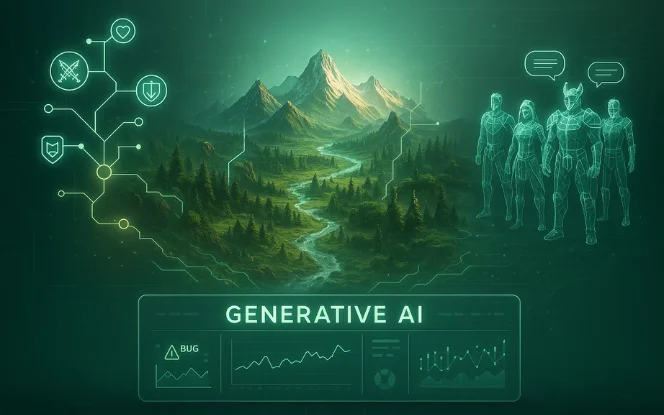
The gaming industry is one of the most dynamic fields where generative AI is driving innovation. By blending creativity with automation, AI is enabling game developers to design expansive worlds, intelligent characters, and immersive experiences that adapt to player behavior. This not only accelerates development cycles but also enhances replay value, keeping players engaged for longer periods.
Procedural Content Generation
Worlds and Levels: AI systems generate vast, complex game environments that would be impossible to build manually.
Quests and Storylines: Models create dynamic missions, branching narratives, and side quests tailored to player decisions.
Assets and Environments: AI automates the creation of textures, landscapes, and 3D models.
AI-Driven NPCs
Natural Dialogue: Large language models power realistic conversations, making non-playable characters more interactive.
Adaptive Behavior: NPCs adjust strategies and responses based on player actions, improving immersion.
Beyond content creation, generative AI is also reshaping quality assurance. Automated game testing allows developers to simulate thousands of gameplay scenarios, identifying bugs and balance issues far more efficiently than human testers. AI-driven balancing ensures that challenges remain fair and engaging across different skill levels, improving the overall player experience.
4. Generative AI for Music Creation

Music is one of the most exciting frontiers for generative AI, where algorithms are not only assisting musicians but also creating original compositions from scratch. AI systems trained on vast libraries of songs can generate melodies, harmonies, and even full orchestral tracks in minutes. This technology is reshaping how music is produced, consumed, and personalized for listeners worldwide.
AI Composers and Instant Track Creation
AIVA (Artificial Intelligence Virtual Artist): Specializes in composing classical and cinematic scores.
Amper Music: Generates royalty-free tracks instantly for content creators and businesses.
Endless Variations: Tools offer multiple versions of the same track to fit different moods or formats.
Personalized Music Streaming
Spotify and YouTube Music: Use generative models to recommend or even create customized playlists.
Adaptive Soundtracks: Music can shift dynamically based on user activity, such as workouts, gaming, or relaxation.
The underlying technologies powering this evolution include recurrent neural networks (RNNs), generative adversarial networks (GANs), and transformers. These models learn musical structure and style, enabling them to produce compositions that capture rhythm, melody, and emotion with surprising accuracy.
5. Virtual Reality and Generative AI
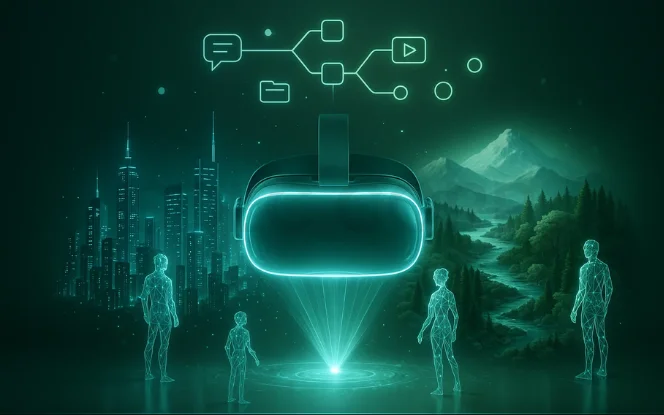
Virtual reality (VR) is rapidly evolving into a more immersive medium with the help of generative AI. By merging advanced algorithms with VR platforms, developers can design environments and characters that feel authentic, adaptive, and deeply engaging. This combination allows users to step into virtual spaces that are not only visually impressive but also responsive to their actions in real time.
How Generative AI Enhances VR Experiences
AI-Generated Worlds: Entire VR landscapes can be built automatically, from futuristic cities to natural ecosystems.
Lifelike Characters: Virtual characters powered by AI adapt dialogue, gestures, and behavior to match user interactions.
Automated Assets: Textures, lighting effects, and soundscapes are created procedurally, reducing manual design work.
Interactive Storytelling: Branching narratives evolve based on player or viewer choices, making each session unique.
The synergy between VR and generative AI goes beyond aesthetics. It transforms virtual spaces into dynamic environments that respond intelligently to user behavior. For example, an AI-generated VR game might change its plot direction depending on a player’s decisions, or a training simulation could adapt scenarios in real time to match learning outcomes. This adaptability not only improves immersion but also creates personalized, evolving experiences for every user.
As VR hardware becomes more accessible and AI models more powerful, the combination of these technologies is expected to redefine digital interaction. From entertainment and gaming to education and professional training, generative AI in VR is paving the way for richer, smarter, and more personalized virtual worlds.
6. AI for Content Personalization in Entertainment
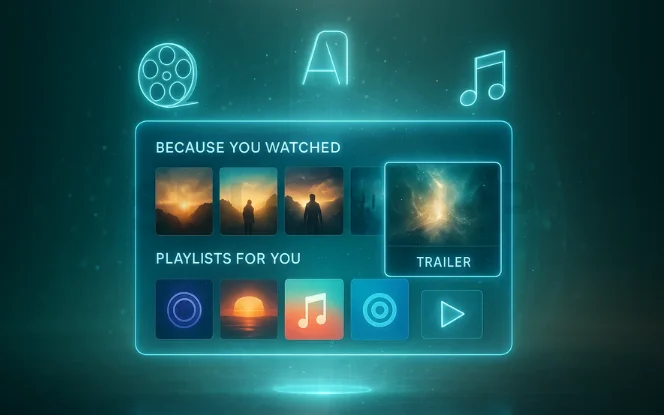
Content personalization has become one of the most impactful applications of AI in entertainment. Audiences today expect experiences that match their tastes and behaviors, and generative AI is helping platforms deliver precisely that. By analyzing vast amounts of viewing and listening data, AI systems can recommend content, customize marketing assets, and even adapt media in real time to suit individual preferences.
Key Applications of AI Personalization
Recommendation Engines: Powered by collaborative filtering and machine learning models, these engines suggest movies, shows, and songs based on user history and behavior.
Streaming Platforms: Netflix, Spotify, and YouTube use AI-driven systems to recommend highly relevant content, keeping users engaged longer.
Personalized Media Assets: AI generates unique trailers, posters, and thumbnails optimized for different audience segments.
The impact of personalization is profound. By tailoring the user experience, entertainment companies boost engagement, increase content discovery, and foster long-term audience loyalty. Personalized recommendations not only keep users watching and listening but also expose them to new creators and genres they may not have explored otherwise.
Generative AI goes beyond simple recommendations by actively creating variations of content to match user interests. For example, a personalized movie trailer might emphasize romance for one viewer while focusing on action for another, even though both trailers promote the same film. This ability to adapt both the product and the promotion ensures a deeper connection between audiences and the media they consume.
7. Ethical Concerns of Generative AI in Entertainment
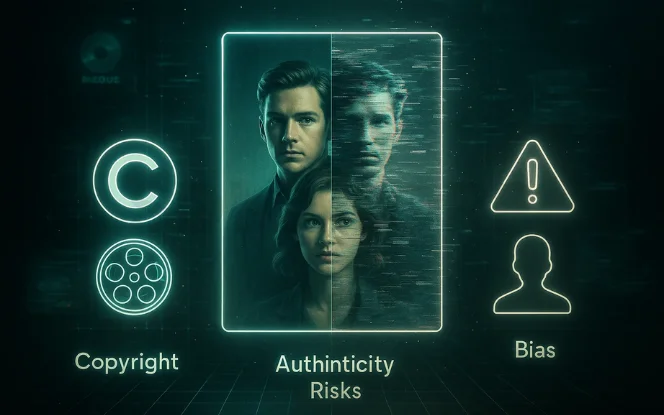
While generative AI unlocks enormous creative potential, it also raises serious ethical questions that the entertainment industry cannot ignore. The same technologies that enable faster production and personalization also present risks around ownership, authenticity, and the future of human creativity. Addressing these issues is essential to ensure AI is used responsibly.
Major Ethical Challenges
Ownership & Copyright: It remains unclear who holds the rights to AI-generated works the developer, the user, or the algorithm itself. This ambiguity complicates licensing, royalties, and creative credit.
Bias & Representation: Since AI is trained on existing datasets, it can unintentionally reinforce cultural stereotypes, leading to unbalanced or even harmful representations in media.
Deepfakes & Authenticity: AI voice and video cloning raise concerns about misinformation, manipulation, and erosion of trust in visual content.
Job Displacement: Automating scriptwriting, music, or design may reduce demand for human creatives, sparking debates about the future of work in entertainment.
Regulation & Transparency: There is an urgent need for industry-wide safeguards, clear labeling of AI-generated content, and frameworks to protect both artists and consumers.
Ethical considerations go hand in hand with innovation. Without transparent rules and responsible adoption, AI risks undermining trust between creators and audiences. By setting regulations, promoting human–AI collaboration, and ensuring fair recognition, the industry can strike a balance between technological progress and cultural integrity.
8. Future of Generative AI in Entertainment
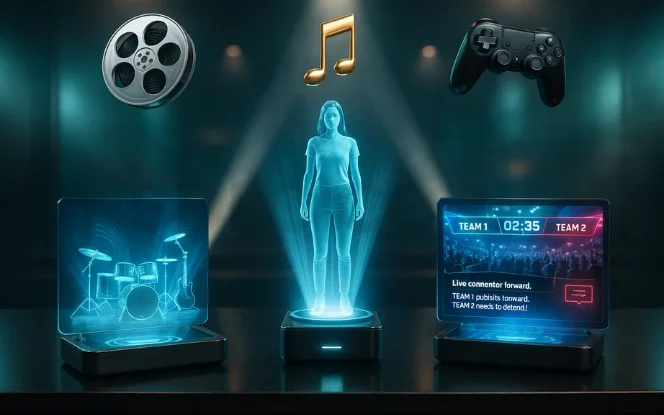
The future of entertainment will be defined by a closer partnership between humans and AI. Instead of replacing creativity, generative AI is expected to serve as a collaborator that enhances human imagination while handling time-consuming or technical tasks. This “balance principle” emphasizes augmentation, not replacement, ensuring that the creative spark remains fundamentally human.
Emerging AI-Powered Experiences
Creative Collaboration: Artists and AI will co-develop films, scripts, music, and artwork, combining originality with computational precision.
AI-Driven Performances: From virtual concerts to digital influencers, AI will power entirely new forms of entertainment experiences.
Esports & Commentary: Generative AI is expected to provide live match commentary, player analysis, and dynamic storytelling in real time.
Adaptive Media: Films and games will evolve interactively, reshaping plots and environments based on each viewer’s or player’s actions.
Market Outlook (2024–2028)
Industry analysts predict rapid growth for generative AI in entertainment, with adoption expanding across production studios, streaming platforms, and gaming ecosystems. The following table illustrates projected
| Year | Market Value (USD Billion) | Key Growth Driver |
|---|---|---|
| 2024 | 5.6 | Early mass adoption in streaming & gaming |
| 2025 | 7.9 | Rise of AI-driven personalization |
| 2026 | 10.3 | Expansion into VR/AR experiences |
| 2027 | 13.8 | AI-human co-creation in music & film |
| 2028 | 17.5 | Industry-wide integration and regulation |
9. Real-World Examples of Generative AI in Entertainment
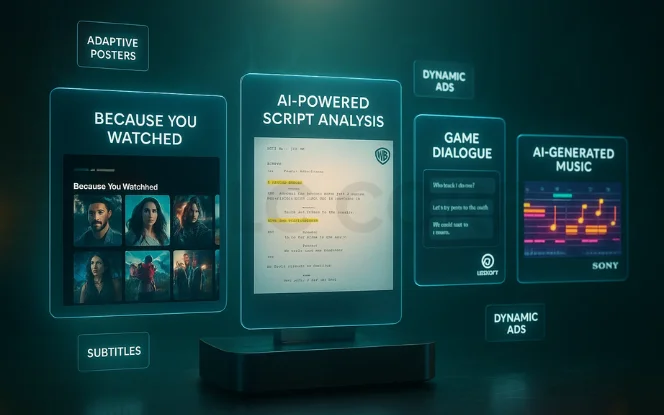
The power of generative AI in entertainment is not theoretical — it is already being applied at scale by some of the world’s largest companies. These case studies demonstrate how AI is reshaping content creation, personalization, and audience engagement.
Industry Case Studies
Netflix: Uses AI to power recommendation engines and generate personalized thumbnails, ensuring viewers discover content tailored to their preferences.
Warner Bros.: Employs AI for script analysis, helping predict box office performance and guiding investment decisions before films are produced.
Ubisoft: Developed the Ghostwriter tool to generate dialogue for non-playable characters (NPCs), streamlining writing tasks while maintaining creative authenticity.
Sony CSL: Experimented with AI to compose pop songs, showcasing the potential for machines to collaborate in mainstream music production.
Other Industry Adoptions: AI is now used for real-time localization, dynamic subtitles, adaptive live event experiences, and generative advertising campaigns.
Not all entertainment workflows benefit equally from generative models. Decisions around script drafting, trailer generation, or music composition require careful evaluation. A Generative AI consulting company can help assess feasibility, data readiness, and creative boundaries before deployment.
Specialized Talent for Generative Workflows
As creative AI systems evolve, teams may hire generative AI developers to fine-tune models, manage datasets, and adapt systems to new formats such as episodic content or interactive media.
Conclusion
Generative AI is already transforming entertainment across film, music, gaming, and virtual reality, delivering creativity, personalization, and scalability once thought impossible. At the same time, it raises ethical concerns around copyright, bias, authenticity, and the potential displacement of creative roles, making responsible adoption essential. The industry must recognize that AI is best positioned as a co-creator rather than a replacement for human imagination, supporting rather than overshadowing artistic expression. When integrated thoughtfully, it enhances creativity, accelerates production, and expands the boundaries of storytelling.
Transparency, fairness, and safeguards will be critical in building audience trust and ensuring cultural integrity in an AI-driven future. The future of entertainment will belong to companies that harness AI responsibly, balancing innovation with accountability. By fostering collaboration between humans and machines, the sector can unlock unprecedented opportunities while addressing its challenges head-on. In this context, exploring advanced AI development solutions offers a practical path for organizations seeking scalable, future-ready experiences.
FAQs
How is generative AI used in entertainment today?
Generative AI is used in scriptwriting, music composition, VFX, gaming, VR environments, and streaming personalization.
Does generative AI replace human creativity?
No, it complements creativity by automating repetitive tasks and offering new ideas.
What are the risks of AI in entertainment?
The main risks include copyright disputes, bias in AI outputs, and potential job displacement.
What is the future of AI in movies and gaming?
AI will enable hyper-personalized experiences, adaptive storylines, and interactive worlds, with humans guiding the creative vision.
Is AI-generated content legal?
Legality depends on copyright laws, which are evolving. Transparency and human oversight are essential.

